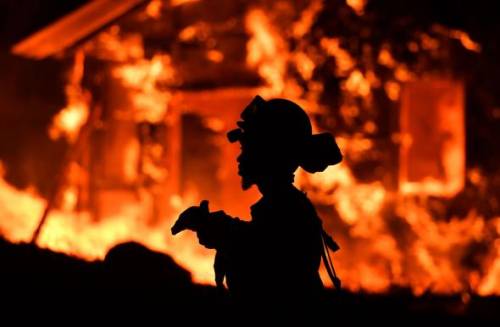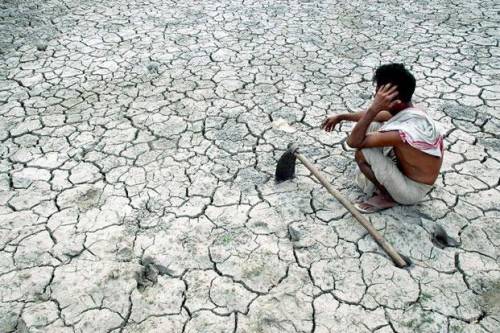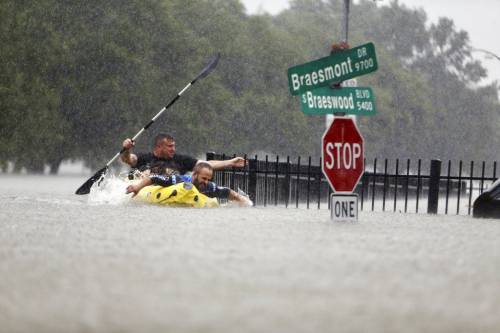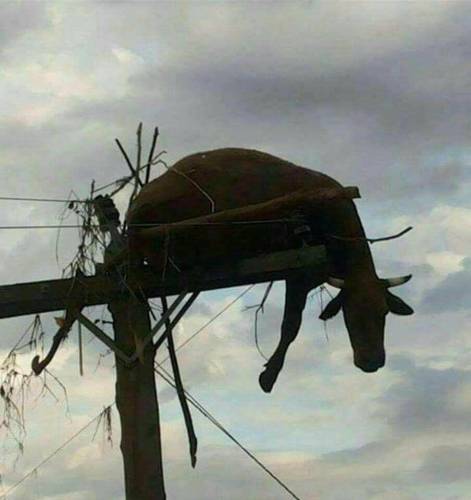ONCE UPON A TIME… a precious planet called Earth was tousled by ferocious disasters, more and more each year! Epic fires, hurricanes, floods and droughts uprooted lives and destroyed nature along with the many edifices built by humans. The faith of the religious was tested, as damage, deluges and death brought to mind the story in Revelations. But trusting in God, they looked deeper beyond the physical effects to ask what they were being called to imagine and do as followers of Christ.
See the new Winter 2017 PHP Post’s center spread on Climate & Disasters
* The families described below are fictional, but based on actual people and events.

A WARMING PLANET & FIRE
The Chavez family, a working-class family in Sonoma County, California, experienced a warm and rainy winter that caused the shrubs and trees to grow profusely. Then, the unusual heat of the summer dried up both the soil and the forests. In October, when the wind roared and wildfires whipped across vast areas of land, they had to flee for their lives.
- Forest fires have doubled in the western U.S. over the last 35 years due as temperatures have risen 2.5 degrees
- Warmer and wetter winters promote vegetation growth and pests, which kill trees
- Hot summers create fire-prone conditions with more vegetation and dead trees to burn
- Lightning strikes increase by 12% for every degree of warming
- Since the 1980’s, the area of forest that burns annually has increased by 600-800%
FIRE AND POVERTY
The family had paid their mortgage payments on their modest home, but they could afford neither good insurance nor fire-proofing improvements. When the flames came, they lost their home and will get little back with which to rebuild their lives.
-

The poor often lack fire-proofing resources, access to fire-fighting services, and fire insurance making their homes more susceptible to wildfires and losses
- Lower income people often take a bigger economic hit in fires because more of their financial assets are tied up in their home and vehicle which can be destroyed by fire
- When homes are evacuated and work places close down, low-income workers have fewer financial reserves to weather the interruption in income
- Fire can cause poor communities to lose access to important subsistence foods found on the land
A WARMING PLANET & HURRICANES
In September, Hurricane Maria washed away the small house of a farming family in Puerto Rico. Down the slope went most of their soil along with their crops and orchard of coffee, papaya and mango trees. It would take years to rebuild the soil, even if they had savings that would enable them to stay there.
- Since the 1970’s, the number of hurricanes reaching categories 4 and 5 has doubled
- As sea levels rise with increasing temperatures, the risks of storm-surge flooding from hurricanes increases
- Warmer sea water leads to more rapid water evaporation which leads to more intense hurricanes
- Air temperatures have been rising since 1970 and warm air holds more water vapor which provides hurricanes with more fuel and leads to more intense rainfall
HURRICANES AND POVERTY
The entire family is sleeping in a room of a sister’s house in San Juan. Once businesses begin to reopen, they will search for odd jobs along with thousands of other displaced people.
- Poor countries often lack national building codes that insure that homes, schools and workplaces are built to withstand hurricane force winds
- Technological warning systems are lacking in poor countries
- Discriminatory housing policies can restrict poor people and people of color to living in flood plains and areas lacking flood safeguards
- Poor people often lack the access and financial resources to afford insurance to repair or rebuild their homes after wind and water damage
- Chemical plants and refineries are often located in poor neighborhoods, placing poor communities at greater health risk during severe storms
A WARMING PLANET & WATER

In East Africa, rain and sunshine had always been things to be celebrated. Now they are to be feared. Mary, the mother of a poor Kenyan family from northern Kenya, explained how when black flies filled the air and it was a sure sign of wet weather approaching. After a decade of drought during the 2000’s, torrential rain caused huge floods and widespread destruction in northern Kenya.
- As the oceans warm, evaporation increases, which generates more rain and snow
- Researchers are confident about the link between more intense heat waves and very heavy downpours that cause flooding
- The atmosphere is also warming, so it holds more moisture – even more than is coming from evaporation and transpiration; one result is more and heavier rains and more dry periods between rains
- A warming world means that more precipitation falls as rain rather than snow, earlier snow melt, and increased evaporation and transpiration; this causes both hydrologic and agricultural drought
Floods
- Hurricane Harvey dumped a year’s worth of rain on Texas and Louisiana in a few days, breaking all US rain records
- This summer in South Asia, 1,300 people died and more than 45 million people were affected by the storms and flooding
 Drought
Drought
- Agricultural drought is when water supplies fail to meet crop water demands; hydrological drought results in depletion of surface and underground water; both are serious threats to food security
- Drought ranks second in terms of national weather-related economic impacts, with annual losses nearing $9 billion per year in the U.S.
FLOODS, DROUGHT AND POVERTY
Now there are no crops, animals or water in the Kenyan village. A quick look around reveals no men, either. “They all left,” says Mary. She says just three of her family’s 100 goats survived the decade-long drought. With no animals to look after, the men have migrated to cities to look for work or sell what remaining possessions they have. “The weather comes and goes now,” she says. “We are left with nothing.”
- In poorer countries and poorer communities in the U.S., sub-quality houses and buildings, as well as infrastructure weaknesses and the lack of early warning systems, results in many more deaths
 When flooding occurs, many people must flee their homes, but poor people have less money to recover and rebuild
When flooding occurs, many people must flee their homes, but poor people have less money to recover and rebuild- Residents trapped by flooding in eastern Houston – disproportionately low-income and minority – reported an “unbearable” smell that was causing headaches, sore and itchy throats and itchy eyes; the cause was a chemical spill from a ruptured petroleum pipeline
- “Fenceline communities can’t leave or evacuate so they are literally getting gassed by these chemicals,” said Houston’s Bryan Parras referring to the off-gassing by oil refineries and chemical plants
- Stagnant water left behind by floods may become a breeding ground for mosquitoes, which in Texas can carry West Nile virus, a potentially-fatal fever

IMAGINING WAYS FORWARD…
Discernment Questions for Individuals or Groups
- What might raging fires be telling us about our relationship to resources we consume in our everyday lives?
- What could hurricanes and floods be telling us about our desires, or about the pace of our lives?
- How can we be more present and bring warmth to difficult conversations with people expressing different viewpoints? [download guides from the Civil Conversations Project]
- What are ways we can bring more warmth and love into our relationships?
- As you envision a society where love and peace prevail, what small things might you do to create new patterns in your family?
- As creation groans from disasters, can we imagine a life-giving, regenerative world, and what small ways might we begin to build that locally?
What does the PC(USA) say?
“Earth-keeping today means insisting on sustainability—the ongoing capacity of natural and social systems to thrive together—which requires human beings to practice wise, humble, responsible stewardship, after the model of servanthood that we have in Jesus.”
[1990 General Assembly Policy, “Restoring Creation for Ecology and Justice]
See PC(USA) Climate Change Resources and Action Ideas!
